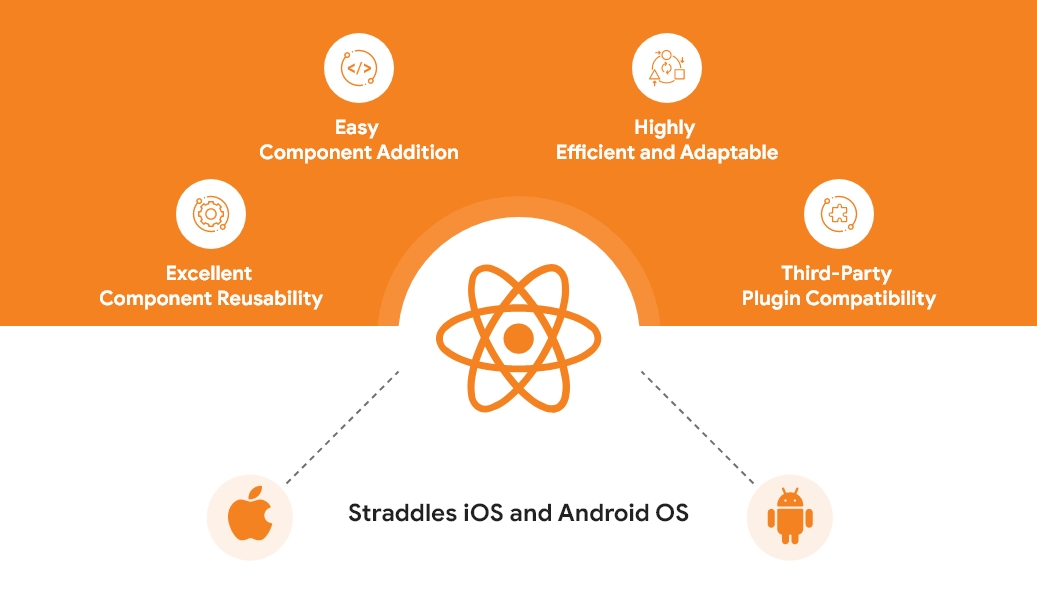
We use cookies to ensure that we give you the best experience on our website.
By using this site, you agree to our use of cookies. Find out more.
Today, companies seek to develop their apps in short development cycles. They want apps with multi-platforms adaptability so to build and capture bigger market share. React native or hybrid app development combines these attributes and leaves for further innovation and customization.

Hybrid mobile apps have come to symbolize and stand for the future of innovation. Today, React native as a cross-platform and hybrid app development platform avails both the performance of a native app as well as the ease of development of a web-based app. Among others it gives and entails:
a) The not only app allows developers to design and build mobile apps with JavaScript codebase but also avails a fast development cycle.
b) It easily combines and incorporates Java, Objective-C, or Swift codebase components with minimal or no lag at all.
c) As a Facebook mobile app, it adapts app components whereas the other part of the app is crafted purely from native app development.
With cross-platform and hybrid app development gaining serious traction lately, it�s not difficult to surmise why. However, serious hybrid app development faces challenges or the burden of best, trustworthy and reliable app development choice that delivers to expectations. Why would a serious app developer bent on creating the best apps choose to React Native app development platform and apps? Below we look at some amazing features it delivers.
a) Easy Integration with Third-Party Apps and Compatibility
b) React Native Avails High Code Reusability
c) React Native Mobile App Development Process Highly Efficiently
d) Supports Development of Versatile Mobile User Interface
e) Highly Portable
Since hybrid mobile app development is in a continuous state of innovation and evolution process it seeks the latest breakthroughs now and then. React Native key examples are best evaluated and illustrated while opting for the app for a company app. Custom or hybrid apps have helped most companies to develop apps easily like web apps and enhance their performance at par with native apps.

Hybrid mobile app development is a continuous innovation and evolution process that seeks the latest breakthroughs now and then. React Native mobile apps are adapted and featured as ads manager app as well as Facebook's React Native app. React Natives' key examples are best evaluated and illustrated while opting for the app for a company app. Custom or hybrid apps have helped most companies to develop apps easily like web apps and enhance their performance at par with native apps.
As React Native straddles iOS or Android OS, companies don't have to focus and commit extra time and resources in developing the app for other platforms. They can adapt similar codebase for multiple operating systems. This is a win-win situation for all.
React Native's components are built for multiple reusabilities on most native platforms. These components with the same counterpart in React Native allow developers to maintain a consistent look and feel in the app development process.
Native User Interface components have the option of adding existing app code without rewriting entire code from scratch.
React Native app development when compared to native app development, is highly efficient, with higher developer productivity, and faster deployment time.
Third-party plugins find easy compatibility as app developers don't just depend on the WebView for specific functions. React Native uses less memory and fast loading capacity.

For most modern mobile app developers React Native hybrid app development offers great insights for innovation, customization, and evolution for various reasons. Since different companies are looking for different objectivities in hybrid app development. There are specific reasons React Native delivers on the general and specific app development goals. What clear reasons make React Native as the best bet future of hybrid mobile app development? This hybrid mobile app development future role further entails:
a) It provides many benefits for app developers such as fast development cycles, code reusability, and fast loading times.
b) The hybrid apps demand is rising overall compared to native apps. Most companies prefer hybrid apps that are simple and compatible with multiple platforms.
c) Hybrid apps have short development times and with short time to market deployment periods. This avails a competitive edge over competitors.
d) Besides the adaptability part, it has gained multi-industry traction as a reliable and dependable app development platform.
Hybrid and native apps both have pros and cons and most companies carefully analyze all options before opting for the most beneficial.
Today, companies seek to develop their apps in short development cycles. They want apps with multi-platforms adaptability so to build and capture bigger market share. React native or hybrid app development combines these attributes and leaves for further innovation and customization.
Leave a Comment
Your email address will not be published.